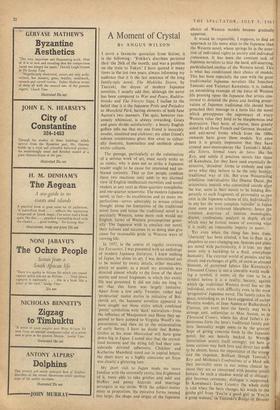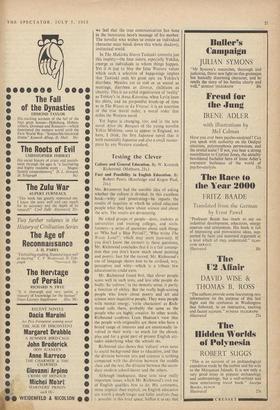A Moment of Crystal
BY ANGUS WILSON
I HAVE a favourite quotation from fiction; it is the following: 'Yokiko's diarrhoea persisted thro' the 26th of the month; and was a problem on the train to Tokyo.' I have quoted it many times in the last two years, always informing my audience that it is the last sentence of the long family-epic novel, The Makioka Sisters, by Tanizaki, the doyen of modern Japanese novelists. 1 usually add that, although the novel has been compared to War and Peace, Budden- brooks and The Forsyte Saga, I incline to the belief that it is the Japanese Pride and Prejudice or Mansfield Park, having elements of both Jane Austen's two manners. The quiz, however tire- somely whimsical, is always rewarding. Goats and goats divide satisfactorily : a hearty English guffaw tells me that my one friend is incurably insular, insulated and cocksure; my other friend's solemn countenance gives him away as cultur- ally insecure, humourless and snobbish about exotic cultures.
The passage, particularly as the culmination of a serious work of art, must surely strike us as comic; why it does not so strike a Japanese reader ought to be cause for interested and un- biased curiosity. That so few people combine these two reactions only adds to my alarmed view Of English intellectuals (novelists and novel- readers at any rate) as three-quarters xenophobic and one-quarter xenoerotic. The modern Japanese novel, in fact—its excellencies and its many im- perfections—serves admirably to arouse critical thought about the limitations of the traditional novel form and (since the traditional novel is a peculiarly Western, some more rash would say English, form) of Western presumptions gener- ally. The Japanese wish to emulate our novel, their failures and successes in so doing also give cause for reasonable pride in Western ways of viewing life.
In 1957, in the course of regular reviewing for Encounter, I was presented with an anthology of modern Japanese literature. I knew nothing of Japan, let alone its art. I was determined not to be misled by exotic details, either macabre, pretty or quaint; as a result my attention was directed almost wholly to the form of the short stories and novel fragments in which this exotic life was presented. It did not take me long to see that this form was largely imitative. Apart from a few early Twenties, rather bad 'proletarian' realist stories in imitation of Bol- shevik art, the Japanese novelists appeared to have sought out those styles which combined 'poetic' symbolism with 'dark' naturalism—from the influence of Maupassant and Hesse they ap- peared to have jumped to Virginia Woolf's im- pressionism, and then on to the existentialism of early Sartre. I have no doubt that Robbe- Grillet at his most Marienbad will have gone down big in Japan. I noted also that the crystal- lised moment and the dying fall had their con- siderable devoted adherents; Chekhov and Katherine Mansfield stood out in capital letters; the short story as a highly conscious art form was clearly a glittering lure.
My short visit to Japan made me more familiar with the externally exotic, less frightened of it, more able to take geishas and sake and fireflies and peony festivals and marriage arrangers in my stride. With the subject-matter more in proportion, the imitative forms loomed less large; the shape and origin of the Japanese choice of Western models became gradually apparent.
It would be impossible, I suppose, to find an approach to life more alien to the Japanese than the Western novel, whose springs lie in the asser- tion of individual rights in society and individual conscience. It has been the constant task of Japanese novelists to blur the hard, self-asserting, particularised ootline of the Western novel. This is what has conditioned their choice of models. This has been especially the case with the great traditionalist Japanese novelists like Junichiro Tanizaki and Yazunari Kawabata; it is, indeed, an astonishing example of the force of Western life pressing upon the Japanese that artists con- cerned to demand the pious and healing preser- vation of Japanese traditional life should have preached their message in a form like the novel which presupposes the supremacy of every Western value they hold to be blasphemous and destructive. They have, of course, been greatly aided by all those French and German 'decadent' and anti-novel forms which from the 1880s onwards have given them models. Yet even here it is greatly impressive that they have created near-masterpieces like Tanizaki's Maki- oka Sisters, formal tours de force like his Key, and subtle if precious novels like those of Kawabata, for they have used essentially de- structive, 'decadent' forms to embody and con- serve what they believe to be the only healthy, traditional way of life. But even Westernising rebellious individualists like Osamu Dazai, the aristocratic beatnik who committed suicide after the war, seem in their novels to be holding des- perately to such fragments of personality as can exist in the Japanese scheme of life. Individuality to any but the most complete 'outsider' in Japan must seem an irrelevant blasphemy; hence the constant assertion of interior monologues, diaries, confessions, analysis in depth, all- of which may be formal means of asserting what if is really an impossible impiety to assert.
Yet even when the thing has been done, 'character' has been created, it has to float in a shapeless or ever-changing sea. Seasons and place are noted with particularity, it is true; yet they seem only a backdrop to a fluid, amorphous humanity. The external world of peonies and tea rituals and exchanges of gifts, of snow or almond blossom, of patterned fabrics like Kawabata's Thousand Cranes is not a concrete world mask- ing a symbol, it seems all the time to be a Symbol before it is a reality. Society, against which tlae traditional Western novel has set the individual, exists with difficulty even in the most 'progressive' Japanese novel. The family takes its place, reminding us, as I have suggested, of earlier 'Western models, of Jane Austen or Richardson's Clarissa, yet even here the family may be a strange unit, unfamiliar to Miss Austen, as in Thousand Cranes, where his dead father's ex- mistresses form the hero's traditional family pat- tern. Sensuality might seem to be the greatest hope of giving concrete forM to the Japanese novel, for sex heavily backed by Westeip materialism asserts itself strongly; yet here La some curious way both love and direct lust seal to be absent, hence the importance of the vomit- and the impotent. Brilliant though Tanizaki's Key and Mishima's Confessions of a Mask are, they inevitably seem to our senses clinical be- cause they are so concerned with passive sexual fantasy. In such a shadow world all is oblique : plot becomes ceremony, dialogue is suppressed. In Kawabata's Snow Country the whole story is told when the hero changes his words to the geisha girl from 'You're a good girl' to 'You're a good woman,' in Tanizaki's Bridge of Dreams
we feel that the true communication has been in the incestuous hero's massage of his mother. The novelist who wishes to create an individual character must break down this whole shadowy, instinctual world.
In The Makioka Sisters Tanizaki commits just this impiety—the four sisters, especially Yokiko, emerge as individuals to whom things happen. Yet it is just to blur the false Western values which such a selection of happenings implies that Tanizaki ends his great epic on Yokiko's diarrheea. Measles are as real or as unreal as marriage, diarrhoea as divorce, chilblains as chastity. This is no artful organisation of 'reality' as Tolstoy's in Anna Karenina, when Levin loses his shirts, and no purposeful break-up of time as in The Waves or Le Voyeur, it is an assertion of the true moral order, a moral order that defies the Western novel.
Yet Japan is changing, too; and in the new novel After the Banquet of the young novelist Yukio Mishima, soon to appear in England, we have, I think, the first Japanese novel that is both essentially Japanese and also a small master- piece by any Western standard.







































 Previous page
Previous page